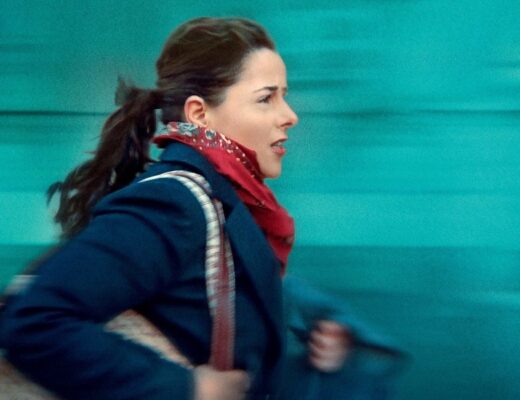Dane Komljen’s previous film, Afterwater (2022), is a triptych exploring the boundaries of humanity’s relationship with gender and the environment. It begins with an observational segment quietly following a couple who work in a lab and then go out to a lake, then freely adapts the text of a Spanish novel, and ends with an abstract science fiction sequence which imagines a future where the binaries of gender and civilization-nature are dissolved.
The Garden Cadences is, in a sense, an answer to the speculative question posed by the final section of that earlier film. Technically a documentary, it shows the lives and environment of a queer feminist collective called the Mollies, living communally in a trailer park on the outskirts of Berlin. They’ve been there a decade, and it’s the final summer before they’re evicted to make way for a new aquarium. Construction has already begun. At a glance, the film resembles some of the works from Harvard’s Sensory Ethnography Lab in its borrowing from slow cinema, the avant-garde, and varied camera equipment to immersively document its subject. But where the SEL films seek to expand the vocabulary of documentary filmmaking into the experiential, Komljen makes little or no distinction between documentary and fiction, narrative and abstraction, using all of these as tools to explore his ideas.
Indeed, the constructed and temporal nature of such boundaries of identity is one such theme, and The Garden Cadences suggests their dissolution. The human subjects are mostly not named, and we learn little about them. Several shots are of bodies intertwined and interacting, others emphasize the flowers and other plants that cover the physical environment. What little dialogue is featured concerns the influence of nature on human life through astrology, or the fluidity and transience of place as people move about with no permanent home. The film’s most memorable sequence is a series of mostly out-of-focus close shots of flowers, the camera pushing slowly through bushes in an abstract evolution of shape and color.
Unlike the future imagined by Afterwater, the reality shown here is doomed to end. Cranes and the sounds of construction loom over almost every scene, never in focus but always threatening to disrupt this fragile utopia. The Mollies have tried to carve out a space that imagines a better world, but the logic of capitalism permits no exceptions.
Published as part of Cinéma du Réel 2024.







